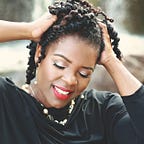Going natural, ‘fro frisking and the politics of hair
Originally published in 2015, this story is updated.
The Transportation Security Administration announced in April 2015 that it no longer will pat down all people with ‘natural’ hair.
A year later, they were still touching. Hmm, that was fast.
In 2019, a TSA agent with locs of her own patted down the head of a woman with braids.
Other examples of hair discrimination:
- In East Texas this month, Gladewater school officials told Kienjanae “K.J.” Hooper that she couldn’t walk in graduation until she removed her braided extensions.
- In Texas earlier this year, Houston-area Barbers Hill Independent School District, told DeAndre Hill he could not go to his prom in his dreadlocks, which extended below the shoulder.
- In 2019, Michigan school officials at Paragon Charter Academy in Jackson County denied Marian a school photo because of her bright red hair extensions.
- In 2017, twins Mya and Deanna Cook were barred from extracurricular school activities, including prom, until they removed their hair extensions.
When I say ‘natural hair,’ I mean black women’s hair that is not chemically relaxed, as that appears to be where most of the ire has centered.
I’m talking, afros, dreadlocks, curly twists, “sister locks” and big, frizzy curls. I include natural-inspired hair extension and braids.
Four states have passed hair discrimination laws: California, New York, New Jersey and Virginia. Certainly not in red-state Oklahoma, where I live.
And the news is filled with examples like the one above, on hair discrimination, particularly with children. Maybe it’s because people in power believe children can be picked on?
I wear my hair both curly or straight, depending on my mood. My straight hair (achieved through blow-drying, not chemicals) is TSA-acceptable. My curly hair, not so much. I have flown since I’ve gone natural, and I find that I am more likely to be searched when I wear my hair natural, then not.
Celebrity Solange Knowles, known for her keen fashion taste and her super-natural hair, said on Twitter: “Discrim-FRO-nation. My hair is not a storage drawer…”
Right on, Solange. I am NOT carrying (anything), TSA officers.
The 2015 announcement came after two women, Malaika Singleton and Novella Coleman, filed complaints with the TSA. Their voices were heard. Coleman, it has been reported, is a staff lawyer with the American Civil Liberties Union. In a letter responding to the women, the TSA said it would offer training and would track further patdown complaints.
Thanks to Malaika and Novella for trying to end the madness.
But it’s not the end of natural hair discussions, because as more black women embrace relaxer-free hair, the more society will take note.
Danielle C. Belton wrote about styling her natural hair, and told readers that it’s not easy having this kind of hair. She writes that her hair can be difficult to style into society-friendly looks, is time-consuming, and is not the romanticized kind of hair is “wash and go.”
My hair — while strong, long and my dominant feature — is a carefully crafted myth that can easily be shattered by stuff like “the wind,” “water” or “the scarf fell off while I was asleep.” — Danielle C. Belton
It appears Ms. Belton and I have similar kind of hair. My main reason for going natural is that relaxers and color are two chemical processes, and my hair only wanted one. After brittle and breaking hair made this clear to me, I opted to cut out the relaxer. NOT the color. (Are you kidding? I’m gracefully aging, but aging all he same.)
Add to this the creation of “natural hair wigs” and natural hair weaves, and women feel pressured to make their curly hair look like something that is not natural at all. Wigs are made to be perfect, where every hair stays in place. Natural hair is just the opposite. Sometimes I want to scream, “stop comparing my hair to that wig!” Or, as Ms. Belton wrote, “That afro is a lie.”
It might seem hard to believe, but I’m not complaining. I love my hair. It’s just another feature that sometimes is used to define me.
I am not my hair, sings India Arie, but it is me. And I’m good with that.
